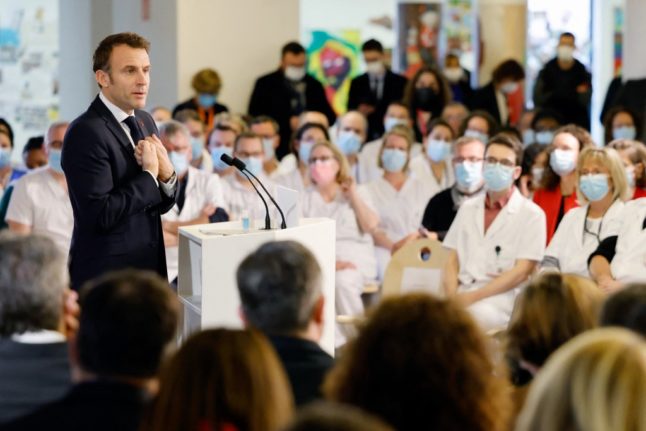French President Emmanuel Macron announced several “concrete” plans to reinvigorate France’s healthcare system during an address to hospital workers on Friday.
During a New Year’s speech at a hospital in Essonne, to the south of Paris, the French president began by acknowledging the “exhaustion” of healthcare workers, saying that the country’s health system was “at the end of the rope.”
Even though the president admitted there would be no “silver bullet” to solve the issues facing French healthcare, he promised to “completely overhaul work in the hospital sector by June 1st.”
The speech came amid a ‘triple epidemic’ of influenza, Covid-19 and bronchiolitis that has overwhelmed French hospitals.
Specifically, the president discussed plans to better organise working hours, address medical deserts, and make the field of primary care work more attractive, in part by hiring more administrative staff.
Reorganising working hours
Regarding working hours, Macron said that the application of the 35-hour work week had “profoundly disrupted hospitals” with its “hyperrigidity.” He said that a new version of the work week would better “represent the reality of your (doctor’s) daily lives.”
The president also said that “each départment must be able to organise itself autonomously” and “with maximum freedom regarding the construction of schedules.”
Macron said he hoped these changes would address the fact that many medical professionals feel “discouraged by impossible timetables.”
Finding solutions to medical deserts
Macron also discussed the issue of medical deserts, where communities do not have nearby access to a general practitioner.
In an effort to help remedy this issue, the president promised that the “600,000 patients in France who suffer from a chronic disease would be offered a primary care doctor – or at least a ‘reference team’ – by the end of the year.”
The president also discussed plans establish a “Conseil national de la refondation (CNR – or National Council for Reconstruction)” to build a “roadmap” for solutions in the fight against medical deserts.
Addressing the lack of general practitioners
Macron also recognised that by 2025 there would only be about 80,000 general practitioners in France, as many primary care physicians are expected to retire in the coming years and the field has suffered from low uptake. Macron said that the effects of this will begin to be most visible within “five to eight years.”
READ MORE: French GPs to extend strike action for another week
The president gave his speech amid an ongoing strike of general practitioners, which was extended until January 8th. Primary care doctors in France have been walking out in protest of working conditions and in hopes of securing more investment in the field to render it more attractive to young medical professionals.
Concretely, striking primary care doctors have demanded a doubling of the basic consultation fee – from €25 to €50 – primarily to help pay for administrative help to offset the time spent on bureaucratic tasks.
However, in his speech, the French president instead discussed potential investments to help make the primary care field more appealing.
The president said that the government would offer better pay to doctors who “take on new patients.”
Changing how the system is financed
The president also discussed plans to “move away from fee-for-service financing” instead toward “mission-based financing,” particularly referencing public hospitals.
He said that this has “created a lot of dysfunction in the system” and that changes would be made within the country’s next “Social Security financing bill” for 2023.
Recruiting medical assistants
The president also referenced the amount of time general practitioners are forced to spend on administrative work, and said that the government would accelerate the hiring of medical assistants, who could help relieve the administrative burdens of healthcare providers.
The head of state said the country hoped to have “10,000 [medical assistants] hired by next year” – an increase from the “nearly 4,000 who have already signed contracts.”
Training more personnel
The French president also discussed plans to continue increasing the “number of places open” to access the healthcare profession via educational programmes, referencing an increase of 20 percent in the last three years.
However, Macron said that one of the primary issues is that many choose to leave during the training period. The president said that to remedy this, the scholastic system would need to do a better job of “properly measuring motivation.”
Macron said that a plan to “reorganise the educational system” would be put in place “by the summer.” He also discussed the issue of students choosing not to work in healthcare directly after finishing their studies, and referenced the possibility of instituting compulsory service in a position upon graduation for new healthcare workers.



 Please whitelist us to continue reading.
Please whitelist us to continue reading.
Member comments